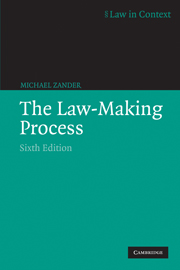Book contents
- Frontmatter
- Contents
- Preface to the sixth edition
- Preface to the first edition
- Acknowledgments
- Books, pamphlets, memoranda and articles excerpted
- Table of cases
- 1 Legislation – the Whitehall stage
- 2 Legislation – the Westminster stage
- 3 Statutory interpretation
- 4 Binding precedent – the doctrine of stare decisis
- 5 How precedent works
- 6 Law reporting
- 7 The nature of the judicial role in law-making
- 8 Other sources of law
- 9 The process of law reform
- Index
7 - The nature of the judicial role in law-making
- Frontmatter
- Contents
- Preface to the sixth edition
- Preface to the first edition
- Acknowledgments
- Books, pamphlets, memoranda and articles excerpted
- Table of cases
- 1 Legislation – the Whitehall stage
- 2 Legislation – the Westminster stage
- 3 Statutory interpretation
- 4 Binding precedent – the doctrine of stare decisis
- 5 How precedent works
- 6 Law reporting
- 7 The nature of the judicial role in law-making
- 8 Other sources of law
- 9 The process of law reform
- Index
Summary
A great deal has been written about the judicial role and no attempt can be made here to cover all aspects of this topic. The issues addressed are only some of those that affect the law-making process but they are perhaps some of the most important. The first is what role is played by the judge himself in the process.
The personal element in judicial law-making
The first extract is from the writings of one of Britain's most distinguished post-war judges.
Lord Radcliffe, Not in Feather Beds (1968), pp. 212–16
More and more I am impressed by the inescapable personal element in the judicial decision. We are fond of saying, approvingly, that a judge should be objective, but is it perhaps the wrong metaphor, an idea borrowed, like so much else that obscures our thinking on general topics, from an analogy between the physical sciences and things incommensurable with them? Say indeed that a judge must be fair, or that he must be impartial: that is essential. He must strip himself of all prejudices, certainly; except, I ought to add, those prejudices which on consideration he is prepared to stand by as his sincere convictions. You see how quickly, just because he is not a machine, one begins to tie oneself in words and qualifications of words. He has no right to be biased; but then no human mind is constructed with perfect balance. He must give an honest hearing to all points of view and to arguments that do not even introduce themselves to him as plausible; but it is unreal to think of a judge of experience as if he were a mere hearing aid. […]
- Type
- Chapter
- Information
- The Law-Making Process , pp. 330 - 422Publisher: Cambridge University PressPrint publication year: 2004



